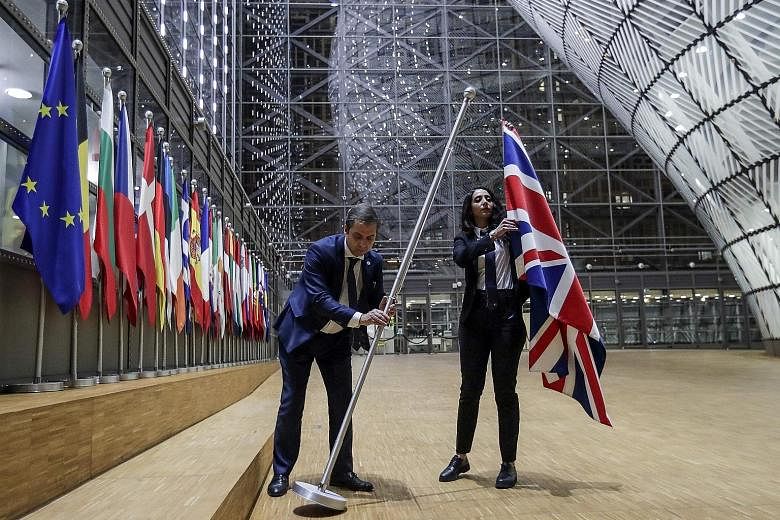Negotiators from Britain and the European Union have agreed on their respective mandates for talks on their future relationship, with each side setting out its "red lines" for the negotiations which open in Brussels next Monday.
Mr Michel Barnier, the French-born chief EU negotiator, spoke of the EU's "readiness to offer an ambitious, wide-ranging and balanced partnership to the UK, for the benefit of both sides".
But as the United Kingdom government revealed in its negotiating position policy paper yesterday, the stances of both sides remain wide apart and chances are high that negotiations will quickly end in deadlock.
In theory, the outlines of the future relationship between the EU and Britain, which formally severed its almost half-century-long membership of the union at the end of last month, are contained in a "political declaration" which British Prime Minister Boris Johnson signed, and which pledges both sides to work towards "a broad, deep and flexible" deal on everything from trade to defence, security and combating crime.
"When you read the political declaration signed by Boris Johnson and negotiated by him and his team, we are not that far apart," said Mr Barnier on Tuesday.
In practice, however, almost everything has changed in London since Mr Johnson won a resounding victory in the snap general elections he called last December.
As Mr David Frost, the British government's key negotiator with the EU, put it in a recent speech in Brussels, the current British stance is not so much that everything must be done to preserve the old trade ties with Europe, but that any future trade deal should allow Britain to set its own trade laws and regulations.
"We bring to the negotiations not some clever tactical positioning but the fundamentals of what it means to be an independent country," said Mr Frost, who insists that this must mean Britain's "ability to set laws that suit us".
That flatly contradicts Brussels' position, which argues that any future trade deal must include "level playing field guarantees" in tax, state aid, environment and labour rights - needed to stop Britain from gaining an unfair advantage over the bloc by undercutting European rules.
A new EU demand, added at the request of France, is that Britain should accept the EU's "product sanitary quality in the agricultural and food sector".
Such a clause will continue to tie Britain to EU food markets, for it will prevent the British from concluding separate trade deals on the import of food from the United States, which has different rules on, for instance, the use of hormones in beef production or the cultivation of genetically modified crops, both of which are banned in the EU.
A separate but equally passionate dispute rages over fishing rights. Britain's territorial waters are among the richest in the region, and Mr Johnson has promised that his country's fishermen will now be allowed the lion's share of this fish.
However, the EU's negotiating position is that not only should the bloc's current fishing quotas in British waters be maintained, but that the entire matter should be satisfactorily resolved by June 1 this year as a pre-condition for concluding an overall trade deal.
Yet, probably the biggest gulf between the two sides is over the very nature of their relationship.
The British claim that they want a deal similar to that which currently exists between the EU and Canada, which eliminates tariffs on most goods, but allows both sides to maintain a relatively large freedom of manoeuvre over deals with other nations.
But the EU claims that a "Canada-style" deal cannot be concluded with the UK, given Britain's "geographic proximity" to European markets.
British officials are furious with this argument. They claim that the EU had already envisaged a Canada-style deal with Britain during talks last year, and that the question of geographic proximity is an irrelevant point, since the distance which goods have to travel before they enter European markets has no bearing on the tariffs which may be applied.
The first encounter between negotiators next week is guaranteed to be testy; both sides need to stake out their position, and probably actually need a public clash.
And it is natural for the EU to believe that it has the upper hand.
It is, after all, much larger than Britain and it easily outflanked the British during the previous separation negotiations.
Still, the EU risks overplaying its hand.
For, unlike his predecessors, Mr Johnson has a firm grip of power in London and is determined not to give in to European demands, even if it means that Britain ends with no long-term trade deal.

